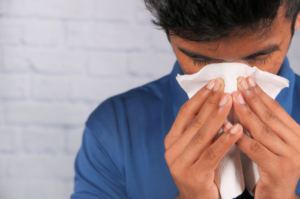Definition: Allergic rhinitis also known as hay fever is a global disease that affects 5%-40% of the world population. It is nothing but an allergic response to certain allergens.
Two main types of allergic rhinitis

Common triggers of allergic rhinitis
- Perfumes and hair sprays
- Air fresheners
- Cigarette smoke
- Car exhaust and air pollutants
Management of allergic rhinitis
Avoiding exposure to the allergens

Problems associated with allergic rhinitis

Medications to treat allergies
Drug Class | Benefits |
|---|---|
| Intranasal corticosteroids | Significantly reduce nasal congestion as well as sneezing, itching and a runny nose. |
| Antihistamines | Help to relieve nasal allergy symptoms such as eye itching, runny nose, hives and eczema. |
| Decongestants | Help relieve the stuffiness and pressure caused by swollen nasal tissue. |
| Other nasal sprays |
|
The overall outcomes of the treatment are based on the severity of allergy. However, the effective management lies in preventing yourself from allergic exposure and thus reducing the chances of the body to adversely respond to the allergens.


